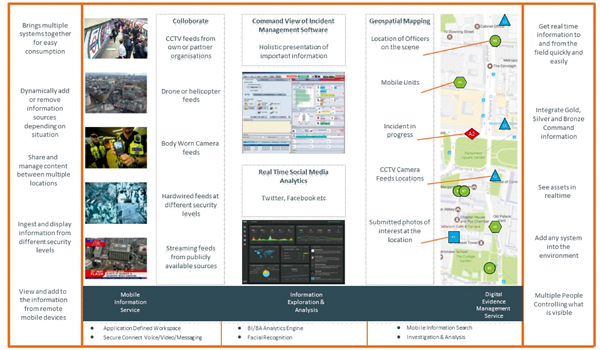Digitally-enabled collaboration vital
What if we could unite multiple agencies across geographically dispersed regions through a multi-dimensional digital environment; enabling the sharing and collaboration of information about crimes, victims, offenders and mission locations quickly to aid decision making about how and where to target limited resources?
What if we could unite multiple agencies across geographically dispersed regions through a multi-dimensional digital environment; enabling the sharing and collaboration of information about crimes, victims, offenders and mission locations quickly to aid decision making about how and where to target limited resources?
That was the question posed by Robert Gittins as part of techUKs recent Security and Law Enforcement Campaign Week, that highlighted how technology is transforming policing and public safety.
Mr Gittins, head of service design and delivery at SecureCloud+, specialists in secure solutions for defence and the public sector, said collaboration was a key part of effective decision-making, and this has never been more relevant than in todays connected world.
The National Police Chiefs Councils Policing Vision 2025 emphasises the need to integrate with other local public services to improve outcomes and protect the vulnerable, he said, adding: This is clearly a key driver in making our community a safer place and enabling timely and adequate response of emergency and security services.
Mr Gittins said the challenge now was how to develop new ways of working while safeguarding existing investments, which are accessible to all and remain financially viable.
It is vital for the safety and security of the wider community to bring together critical information in an immersive real-time collaboration from any source, he said,
This could be digital/forensic evidence, CCTV, drones, social media, surveillance teams, body-worn camera footage, facial recognition and geolocation systems, which fuse with human and machine intelligence in demanding operational situations where informed decisions need to be made quickly.
Mr Gittins said accredited services, such as the Networked Collaboration Service (NCS), which are fully operational in areas of defence, enable the real-time sharing of multi-sourced information of known (trusted) and open (untrusted) formats to be shared in real time.
This bringing of information and people together across geographically dispersed groups to review, discuss and analyse enables intelligence-based decisions to be made quickly and effectively.
The power of the system goes yet further, the ability to display multiple security classifications while dynamically adding and removing information streams creates a virtual incident room, a command and control suite and an intelligence monitoring solution, he added.
Embracing innovative technologies such as the NCS service, further improves public trust in the effectiveness of our law enforcers to safeguard our society.
As quoted in the Policing Vision 2025, this service will develop our network and the way we deliver specialist capabilities by reinforcing and connecting policing locally, nationally and beyond.



